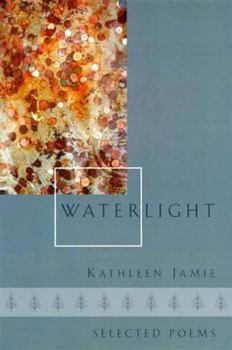Waterlight: Selected Poems
The first U.S. publication of Scottish poet Kathleen Jamie, author of The Tree House , winner of the 2004 Forward Prize for best poetry collection It isn't mine to give. I can't coax this bird to my... This description may be from another edition of this product.
Format:Paperback
Language:English
ISBN:1555974651
ISBN13:9781555974657
Release Date:March 2007
Publisher:Graywolf Press
Length:140 Pages
Weight:0.45 lbs.
Dimensions:0.4" x 6.1" x 8.9"
Related Subjects
PoetryCustomer Reviews
1 rating
complex tapestry of image, politics and sound
Published by Thriftbooks.com User , 17 years ago
The understated wonder in Kathleen Jamie's U.S. debut, Waterlight, is a surprise that sneaks up on the reader. Jamie has been writing for more than twenty years and has been called "the leading Scottish poet of her generation" (The Sunday London Times). The poems in this collection are sparse and layered with sound and narrative, littered with questions involving both the personal self and the world around the self. The natural world has as much to do with these poems as do the images and moments the poems give praise to. There is "light" in many of her poems and though the tunnel may be acknowledge, the light always peeks through. Jamie's poems are able to bring new perspectives to familiar images; she has an eye for the small things in the world, the things others may not see. In poems such as "Rhododendrons," the speaker of each poem is on a path of discovery, both personal and more specific. In this poem, she writes: It wasn't sand martins hunting insects in the updraught, or the sudden scent of bog myrtle that made me pause, lean across the parapet, but a handful of purple baubles reflected below the water's surface as comfortable and motionless as a family in their living room. watching TV. What was it, I'd have asked, to exist so bright and fateless while time coursed through our every atom over its bed of stones - ? But darkness was weighing the flowers and birds' backs, and already my friends had moved on. Here, the rhododendrons that are below the surface, tucked away next to stone. The poem asks us to think of all of the things we do not see and all of the things we move past without thought, just like the speaker's friends at the end of the poem. Jamie's poems are as much about discovery as they are about the images that make us take pause. Her perspective is framed by each poem's attention to sound. Many of the end words echo to one another, such as in the second stanza's "parapet" and "purple baubles." The attention to sound and the slow pacing offered up by her short lines results in work that is as much meditative as it is focused. Her poems are steeped in tradition. Not only is rhyme common place, but Jamie also uses a Scots dialect for many of her poems; this decision offers a new layer or context to the individual pieces as well as to other poems in the collection. Jamie's heritage is all around her and these poems offer shed light on a new perspective and a new way of layering sound. Jamie's feminist sensibilities shine through in such poems as "Pioneers." Here, history again makes an appearance, but not without criticism. She writes: ...Pioneers; their remains now strewn across the small-town museums of Ontario: the axe and the grindstone, the wife by the cabin door dead, and another send for. Here, we again see her shed light on what has not been seen or spoken of before. The pioneers become the women unseen, dead and standing by the cabin door. This collection will sneak up on you. I devoured it hungrily, eage





